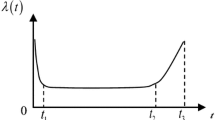Abstract
The present study incorporates the weakest t-norm (Tw) based approximate Pythagorean fuzzy arithmetic operations on different types of Pythagorean fuzzy numbers to investigate the fuzzy reliability of a weapon system. In many real-world problems, sometimes due to the absence of adequate failure data of system components, the assessment of the precise probability of failure of system components may not be an easy task. Therefore, the failure data of system components can be assumed in fuzzy form. This study extends the concept of an intuitionistic fuzzy set into a Pythagorean fuzzy set, utilizing a novel approach to address the system failure probability with quantitative failure data of system components using fault tree analysis. In complex systems, interval arithmetic operations on fuzzy numbers may lead to an increasing tendency of fuzziness. To decrease the fuzzy spread up to a desired degree of accuracy during the complicated calculations of complex systems under an imprecise environment, approximate Pythagorean fuzzy arithmetic operations are developed based on the weakest t-norm methodology. Further, the fuzzy reliability of series and parallel systems is constructed using the aforesaid approach. The proposed study has been applied to a fault in a weapon system as an illustration.






Similar content being viewed by others
Abbreviations
- \({T}_{w}\) :
-
Weakest \(t\)-norm
- \(\widetilde{P}\) :
-
Pythagorean fuzzy set
- \({\omega }_{\widetilde{P}}/ {\xi }_{\widetilde{P}}\) :
-
Membership/non-membership functions of Pythagorean fuzzy set \(\widetilde{P}\)
- \({\widetilde{R}}_{S}^{(\alpha )}\) :
-
α-cut corresponding to the membership for fuzzy reliability of the series system
- \({}^{(\alpha )}{\widetilde{R}}_{S}\) :
-
α-cut corresponding to non-membership for fuzzy reliability of the series system
- \({\widetilde{R}}_{P}^{(\alpha )}\) :
-
α-cut corresponding to the membership for fuzzy reliability of the parallel system
- \({}^{(\alpha )}{\widetilde{R}}_{P}\) :
-
α-cut corresponding to non-membership for fuzzy reliability of the parallel system
- \(r_{iL}^{(\alpha)}/r_{iU}^{(\alpha)}\) :
-
Lower/upper bound corresponding to membership function of fuzzy reliability
- \({{}^{\left(\alpha \right)}r}_{iL }/{{}{}^{(\alpha )}r}_{iU }\) :
-
Lower/upper bound corresponding to non-membership function of fuzzy reliability
References
Atanassov KT (1983) Intuitionistic fuzzy sets. VII ITKR’s Session, Sofia deposed in Central Science-Technical Library of Bulgarian, Academy of Science, 1697/84 (in Bulgarian)
Atanassov KT (1986) Intuitionistic fuzzy sets. Fuzzy Sets Syst 20(1):87–96
Biswas R (1997) On fuzzy sets and intuitionistic fuzzy sets. NIFS 3:3–11
Bi Y, Wang S, Zhang C, Cong H, Qu B, Li J, Gao W (2022) Safety and reliability analysis of the solid propellant casting molding process based on FFTA and PSO-BPNN. Process Saf Environ Prot 164(1):528–538
Bisht S, Singh SB, Tamta R (2020) Reliability evaluation of repairable weighted system using interval valued universal generating function. Int J Qual Reliab Manag 37(6/7):957–981
Chang JR, Chang KH, Liao SH, Cheng CH (2006) The reliability of general vague fault-tree analysis on weapon systems fault diagnosis. Soft Comput 10(7):531–542
Cheng SR, Lin B, Hsu BM, Shu MH (2009) Fault-tree analysis for liquefied natural gas terminal emergency shutdown system. Expert Syst Appl 36(9):11918–11924
Chandna R, Ram M (2014) Fuzzy reliability modeling in the system failure rates merit context. Int J Syst Assur Eng Manag 5(3):245–251
Chaube S, Singh SB (2016a) Fuzzy reliability theory based on membership function. Int J Math Eng Manag Sci 1(1):34–40
Chaube S, Singh SB (2016b) Fuzzy reliability of two-stage weighted k-out-of-n systems with common components. Int J Math Eng Manag Sci 1(1):41–51
Chang KH (2019) A novel supplier selection method that integrates the intuitionistic fuzzy weighted averaging method and a soft set with imprecise data. Ann Oper Res 272(1/2):139–157
Dubey SK, Singh S, Chaudhary H (2017) Evaluation of reliability of critical software system using fuzzy approach. Int J Syst Assur Eng Manag 8(2):1327–1335
Garg H (2014) A novel approach for analyzing the behavior of industrial systems using weakest t-norm and intuitionistic fuzzy set theory. ISA Trans 53(4):1199–1208
Gu GY, Wei FJ, Zhou SH (2015) Risk assessment method for mass unexpected incident in city with hesitant fuzzy linguistic information. J Intell Fuzzy Syst 29(5):2299–2304
Gaonkar RSP, Nigalye AV, Pai SP (2021) Possibilistic approach for travel time reliability evaluation. Int J Math Eng Manag Sci 6(1):223–243
Hong DH, Do HY (1997) Fuzzy system reliability analysis by the use of Tw (the weakest t-norm) on fuzzy number arithmetic operations. Fuzzy Sets Syst 90(3):307–316
Huang HZ, Tong X, Zuo MJ (2004) Posbist fault tree analysis of coherent systems. Reliab Eng Syst Saf 84(2):141–148
Hari Prasad M, Rami Reddy G, Srividya A, Verma AK (2012) Reliability estimation of passive systems using fuzzy fault tree approach. Int J Syst Assur Eng Manag 3(3):237–245
Halloul Y, Chiban S, Awad A (2019) Adapted fuzzy fault tree analysis for oil storage tank fire. Energy Sources Part A Recov Util Environ Effects 41(8):948–958
Jafari MJ, Pouyakian M, Hanifi SM (2020) Reliability evaluation of fire alarm systems using dynamic Bayesian networks and fuzzy fault tree analysis. J Loss Prev Process Ind 67(5):104229
Kumar M, Yadav SP (2012) The weakest t-norm based intuitionistic fuzzy fault-tree analysis to evaluate system reliability. ISA Trans 51(4):531–538
Kumar M (2014) Applying weakest t-norm based approximate intuitionistic fuzzy arithmetic operations on different types of intuitionistic fuzzy numbers to evaluate reliability of PCBA fault. Appl Soft Comput 23(12):387–406
Kuzu AC, Akyuz E, Arslan O (2019) Application of fuzzy fault tree analysis (FFTA) to maritime industry: a risk analysing of ship mooring operation. Ocean Eng 179(9):128–134
Kumar M, Singh SB (2022) System reliability analysis based on different types of Pythagorean fuzzy failure rates of components. Nonlinear Stud 29(3):779–808
Kumar M, Singh SB, Kumar D (2023) System reliability analysis based on Pythagorean fuzzy set. Int J Math Oper Res 24(2):253–285
Kaushik M, Kumar M (2022) An application of fault tree analysis for computing the bounds on system failure probability through qualitative data in intuitionistic fuzzy environment. Qual Reliab Eng Int 38(5):2420–2444
Liu Z, Li Y, Zhang N, Liang Z, Li F (2021) Reliability analysis of CFRP-packaged FBG sensors using FMEA and FTA techniques. Appl Sci 11(22):10859
Nautiyal N, Singh SB, Bisht S (2020) Analysis of reliability and its characteristics of a k-out-of-n network incorporating copula. Int J Qual Reliab Manag 37(4):517–537
Purba JH (2014) A fuzzy-based reliability approach to evaluate basic events of fault tree analysis for nuclear power plant probabilistic safety assessment. Ann Nucl Energy 70(8):21–29
Srinath LS (1991) Reliability engineering, 2nd edn. East-West Press, New Delhi
Shu MH, Cheng CH, Chang JR (2006) Using intuitionistic fuzzy sets for fault-tree analysis on printed circuit board assembly. Microelectron Reliab 46(12):2139–2148
Tanaka H, Fan LT, Lai FS, Toguchi K (1983) Fault-tree analysis by fuzzy probability. IEEE Trans Reliab 32(5):453–457
Tyagi K, Sharma A (2016) Ranking of components for reliability estimation of CBSS using fuzzy TOPSIS. Int J Syst Assur Eng Manag 7(1):41–49
Yan L, Zhang T, Gao Y, Wang R, Ding S (2021) Reliability analysis of station autonomous computer system based on fuzzy dynamic fault tree and Markov model. Eng Rep 3(8):12376
Yager RR (2013) Pythagorean membership grades in multicriteria decision making. IEEE Trans Fuzzy Syst 22(4):958–965
Zadeh LA (1965) Fuzzy sets. Inf Control 8(3):338–353
Zhang X, Xu Z (2014) Extension of TOPSIS to multiple criteria decision-making with Pythagorean fuzzy sets. Int J Intell Syst 29(12):1061–1078
Acknowledgements
This research work is supported by Grants from the Council of Scientific & Industrial Research (CSIR), India, to Mintu Kumar via Senior Research Fellowships (SRF).
Funding
This research received no external funding for APC.
Author information
Authors and Affiliations
Corresponding author
Ethics declarations
Conflict of interest
The authors declare that there is no conflict of interests regarding the publication of this research.
Human participants and/or animals
This research does not involve involving Human Participants and/or Animals.
Informed consent
This research does not require any consent.
Additional information
Publisher's Note
Springer Nature remains neutral with regard to jurisdictional claims in published maps and institutional affiliations.
Rights and permissions
Springer Nature or its licensor (e.g. a society or other partner) holds exclusive rights to this article under a publishing agreement with the author(s) or other rightsholder(s); author self-archiving of the accepted manuscript version of this article is solely governed by the terms of such publishing agreement and applicable law.
About this article
Cite this article
Kumar, M., Singh, S.B. Analysis of system reliability based on weakest t-norm arithmetic operations using Pythagorean fuzzy numbers. Int J Syst Assur Eng Manag 15, 1467–1482 (2024). https://doi.org/10.1007/s13198-023-01906-3
Received:
Revised:
Accepted:
Published:
Issue Date:
DOI: https://doi.org/10.1007/s13198-023-01906-3




